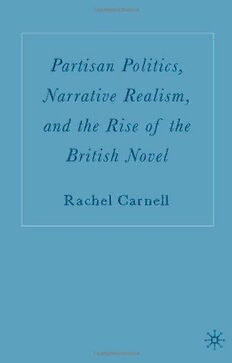
Partisan Politics, Narrative Realism, and the Rise of the British Novel PDF
237 Pages·2006·0.879 MB·English
Most books are stored in the elastic cloud where traffic is expensive. For this reason, we have a limit on daily download.
Preview Partisan Politics, Narrative Realism, and the Rise of the British Novel
Description:
Narrative realism has long been understood as a full account of "real life" and the individual self. Breaking with this traditional history, Partisan Politics, Narrative Realism, and the Rise of the British Novel demonstrates that the formal conventions of narrative realism emerged at the end of the seventeenth century in response to an explosion of partisan writings that offered rival versions of political selfhood. The novel mediated between the competing Whig, Tory, and Jacobite versions of selfhood that emerged during the upheavals of the 1680s and flourished through the mid 1750s. The rise of the novel was connected to the rise of "the individual," as traditional accounts proposed, but this Whig individual was just one of several partisan versions of the self that were vying for pre-eminence during this period.
See more
The list of books you might like
Most books are stored in the elastic cloud where traffic is expensive. For this reason, we have a limit on daily download.
